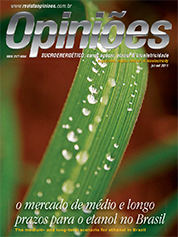Julio Maria M. Borges
Executive Director of JOB Economia e Planejamento
Op-AA-29
Signs indicate a bright future
Markets: As concerning the sugar market, the world consumption growth perspective, based on the reality of developing countries, particularly the BRICs, is set at additional consumption in the range of four million tons per year.
Brazil is a natural candidate for participating with at least 50% in the additional supply of the product, given that the country still has land available to grow sugarcane plantations without competing with the production of food. As concerning ethanol markets, one can see that ethanol for other than fuel applications is characterized by growing domestic and international markets willing to pay premium prices for the product.
In this sense, reference should be made to the chemical industry, which for economic and production sustainability-related reasons is a major potential consumer of ethanol from sugarcane. Anhydrous ethanol mixed with gasoline has a big growth potential domestically and globally, given that it is an efficient fuel and improves gasoline quality, even from the perspective of sustainability.
Hydrated ethanol fuel, used in flex-fuel cars, is basically a situation found in Brazil. In this sense, it will play an essential role as an adjustment variable for supply and demand of ethanol in the country.
As concerning electric power generated from sugarcane bagasse, it has a high growth potential, considering that the demand for electric energy in Brazil is increasing, while the supply from hydroelectric sources is more vulnerable to climate conditions and more complex from an operational point of view (waterway projects - Belo Monte, Jirau, Santo Antonio). One should also not forget that the uncertain global economic recovery process inhibits demand growth in the short-term.
Costs: Ethanol costs are expected to increase in the short- and medium-term, even when taking into consideration that economies of scale in the industry represent lower sugarcane processing costs. One should also not forget that the appreciated foreign exchange rate adversely affects our international competitiveness.
Increasing ethanol costs in Brazil may result from (1) competition for land between energy and food, increasing its price and leasing costs; (2) the occupation of new areas with less agricultural potential and more complex logistics; (3) the difficulty in hiring and competing for labor in a scenario of economic growth in the country.
Sustainability: This aspect is crucial in our opinion when one looks to the future of the sugar and ethanol business in Brazil. It is apparent that the world is rapidly seeking to preserve its natural resources and undertaking actions that aim at the social and environmental sustainability of economic activities. From this standpoint the sugarcane industry in Brazil is very well positioned globally and hence has been supported by municipal, state, and the federal governments.
Technology and risks: When one looks at the future of the sugarcane industry in Brazil, one must consider the technological challenges and risks to be faced.
“Cons”: Among others, one may mention second generation ethanol, wind energy, electric vehicles, the use of coal with clean technologies, new oil reserve discoveries, OPEP’s production capacity, restrictions and delays in using genetically modified products in Brazil, and more efficient conventional cars.
“Pros”: One could list, among others, the increasing risks resulting from the oil market, the high dependence on OPEP oil, increasing costs of conventional energy alternatives and the application of the concept of sustainability.
State intervention in the industry: Brazil’s Federal Government has provided constructive support for ethanol fuel with excellent results. On the other hand, it is currently intending that hydrated ethanol fuel, used in flex-fuel vehicles, become a benefit guarantee for the consumer during the whole year.
To that end, it intends to apply direct intervention mechanisms that will result in inefficiencies in the system. What good is the benefit guarantee objective to the consumer during the whole year? Obviously, for political reasons.
On the other hand, and for the sake of economic efficiency and the industry’s growth based on sound market bases, hydrated ethanol fuel (an agricultural product) should be considered a solution for the consumer during the year, but not necessarily during the whole year.
Financing and the activity’s economic feasibility: Brazil has the potential to double its sugarcane production in ten years, provided prices in the sugarcane industry warrant adequate returns on investment.
With respect to the availability of financing for the needed investments, one sees no restriction on supply if, and only if, the condition of the preceding paragraph is fulfilled. But what is to determine such condition? Mainly oil prices. Furthermore, the exchange rate, improvements to export logistics, the technology involved, for the good or the bad, efficient management of the sugar and ethanol business.
Like always, uncertainties and risks exist with respect to the future. The speed of growth of Brazil’s sugarcane industry will depend on these variables. On the other hand, the signs set by investments of multinational groups in the industry allow us to believe the sugarcane industry’s future in Brazil is a bright one.




